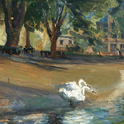Laurie Anderson is sitting near BBC Broadcasting House in London, telling me about the past and the future of the United States. She is in town to discuss her latest album, a piece of high-wire ambition for voice, electronics and orchestra about the aviator Amelia Earhart, and also her forthcoming stage show, Ark, which will premiere in Manchester in November. Speaking shortly before Kamala Harris became the Democratic nominee, she can’t help but fear the worst. “We’re sleepwalking into a shit-shower,” she insists. “Ark will happen a couple of days after the election, and that hangs heavy as I write. It’s a Domesday comedy, but I can’t tell you more than that—how I think of it changes every day.”
Anderson, 77, has spent the past five decades working between experimental and pop music-making. Her mesmeric 1981 song “O Superman” brought her mainstream recognition. Since that brush with the charts, she has worked up a sequence of albums—Home of the Brave, Life On A String, Homeland—which have drawn on her deep understanding of jazz, improvised music and experimental electronica. She met Lou Reed in 1992, and they were married in 2008 until the singer-songwriter’s death five years later.
Amelia, released 30th August on Nonesuch Records, had changed from the initial version Anderson presented at Carnegie Hall in 2000. “Amelia became a hero for me after I was asked to write something about flight by the conductor Dennis Russell Davies,” Anderson recalls. “I fell in love with one thing she said: ‘If I can come back from this flight, I’m going to make sure there’s “shop” for girls’. ‘Shop’ in the 1930s meant metalwork, woodwork and engineering for boys at school, while girls had home economics, cooking, and sewing.”
The tragedy of Amelia Earhart is, of course, that her aeroplane plunged into the Pacific Ocean in 1937 as she attempted to land on Howland Island, and she never returned from that final flight. “I view my music as a celebration, not a mourning,” Anderson asserts. “What a great story! This young woman who loved speed, loved technology, who was flying into the future of aeronautics. I’m proud of her legacy, but also troubled when I think about how heavily militarised science and technology became in the US after the war.”
Learning to pilot a full orchestra herself was no easy task. “I’d never written for orchestra before and, watching Dennis rehearse, I thought: this is the worst thing I’ve ever heard. But in the concert, my piece did sound like actual music. I realised that writing for orchestra is a weird process. A few years later I made a version just for strings, then Dennis called me up during the pandemic. ‘Let’s record it,’ he said, and I began to hear my music in a new way. On top of my voice and the orchestra, I added layers of electronics, guitar, bass and drums... Amelia’s actual voice is also present, from when she was on the radio.”
Near the end of our time together, Anderson reveals that Ark will deal with artificial intelligence. I’m not surprised to hear that Anderson, who has always been plugged into electronics—witness her classic 1982 album Big Science—is grappling with the consequences of AI. “So much AI feels like monkeys with typewriters, producing words that mimic language, but not meaning,” she says, before a pause. Now is not the time to elaborate on a composition she hasn’t finished. Although one final thought—“it’s about that area beyond language, where music can live”—which sounds like the stirrings of a promising piece.












